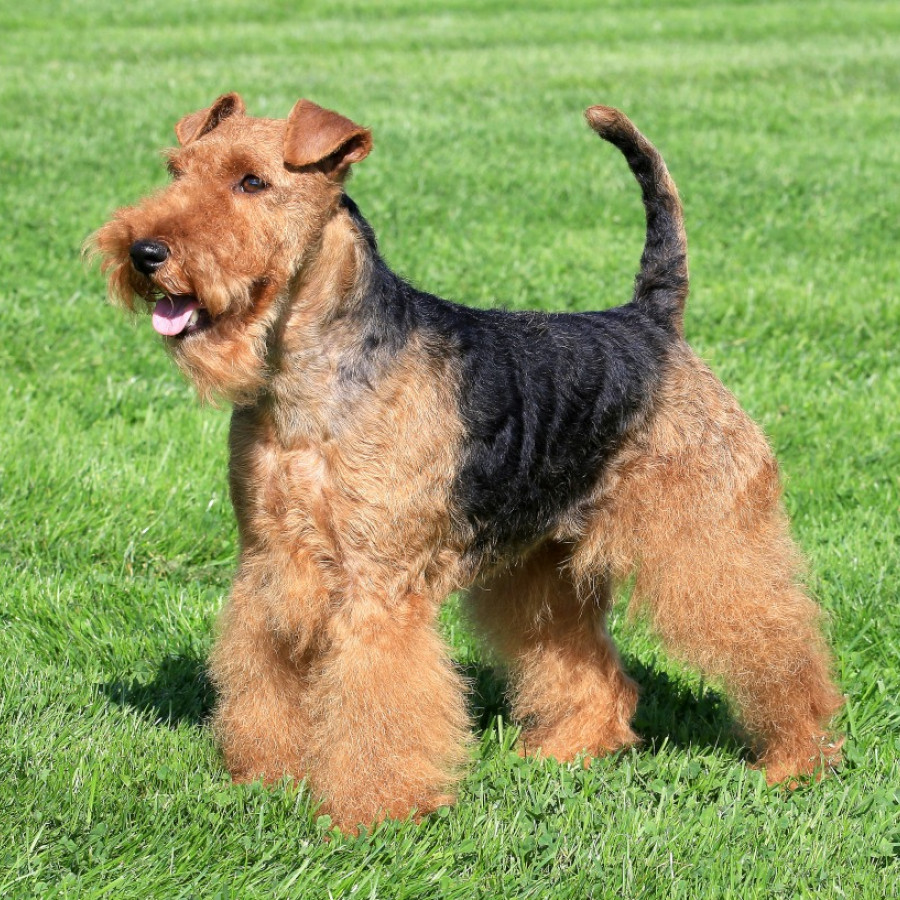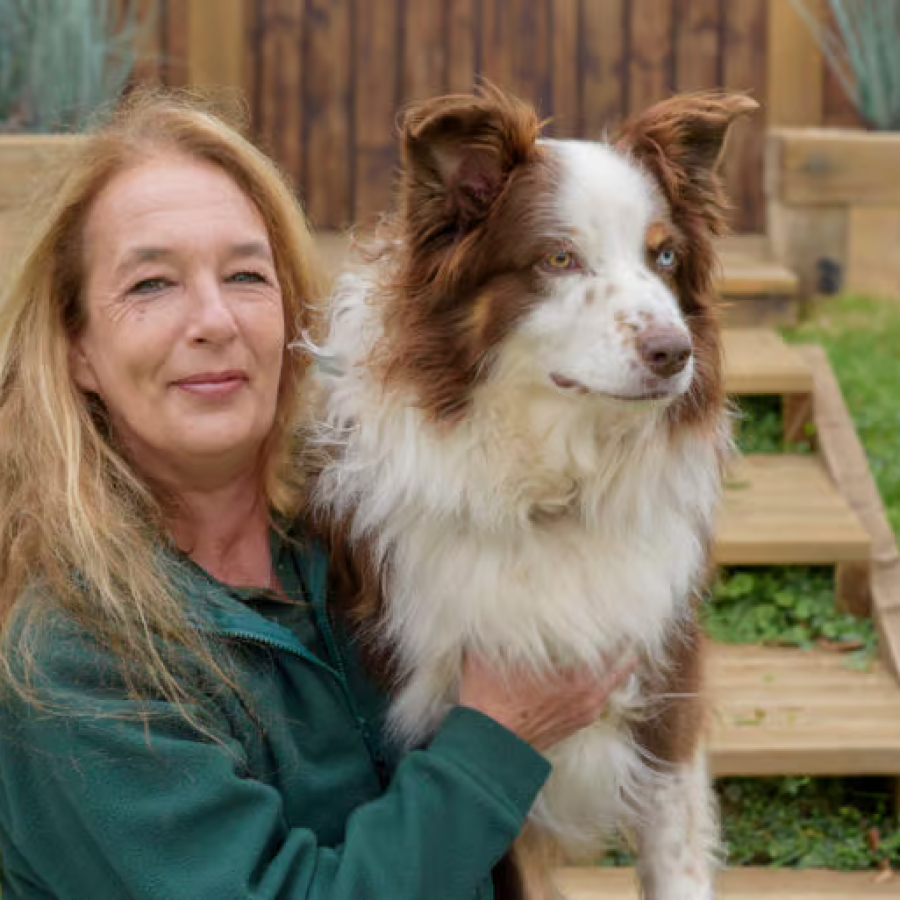
Welsh Terrier Dog Breed
Welsh Terriers are a full-of-beans breed! These bright, energetic dogs are fiercely loyal and extremely playful.

Welsh Terriers are a full-of-beans breed! These bright, energetic dogs are fiercely loyal and extremely playful.
Welsh Terriers are a hardy, tenacious, small breed that love hunting and playing. Their high prey drive and independent streak make them challenging for first time dog owners and unsuitable for small pets’ homes (unless highly socialised). They’re well suited to families with older children or an older, active person/couple.
The Welsh Terrier is full of life and energy! They’re bold, confident, and sometimes have an independent streak that makes training challenging. However independent they may be, they do form strong bonds with their main caregivers.
Don’t let their size fool you, these little dogs have a LOT of physical stamina and are happiest when hunting and digging. Welsh Terriers are very intelligent and always on alert. Because of this, they make natural watchdogs and are always ready for action. Terriers can be prone to nipping at ankles when they are young or bored, so keeping them entertained and well trained is essential.
Disclaimer
While these breed traits give a general idea of what to expect from a specific type of dog, it's important to remember that every dog is unique. Just like people, each dog comes with their own distinct personality, quirks, and characteristics!

Welsh Terriers can make great family pets; however, they’re best suited to homes with older children. They can be very nippy as youngsters and even in adulthood will enjoy seeking out and destroying soft toys (keep any precious teddies out of their reach!).
Older children are better suited to the Welsh Terrier’s high energy and feisty play style.
Although this breed suits families well, they do need a lot of time dedicated to their playtime, training, mental and physical exercise. So, it’s important to consider how you’ll make enough time for your Terrier whilst still managing a family and household.
The Welsh Terrier has an affectionate and loving nature. They form strong bonds with their main caregivers and are incredibly loyal.
If their needs are met, they will happily snuggle on the sofa with you in the evenings and serve as a great little hot water bottle on a cold night.
This strong bond can mean they don’t like sharing their favourite person and may become grumpy (growling or snapping) if they are approached when receiving attention from this person. Their loyalty means that they’re likely to struggle with being left home alone for extended periods, so they need a family where someone either works from home or is retired. They would be ideal for an active, retired couple/person, or an at-home worker who can still make them the centre of attention despite the nine to five.
Yes! The Welsh Terrier is extremely playful. Their high prey drive and hunting skills mean that it’s essential to provide them with playtimes where they can seek, find, and shake their soft toys. They also love squeaky toys (which sound like the animals they were bred to hunt) so these can be a great training aid.
Like all Terriers, they love to dig, so giving them a sand or ball pit will bring them lots of fun and be a great outlet for all their energy. They also love to play tuggy, which is another great game for satisfying their prey drive.
Clearly, it’s essential that you have the time and energy to provide regular, daily, playtimes for this very playful breed.
Welsh Terriers are an incredibly alert little breed, they are ready for anything at any time. As such, they make excellent watchdogs and will let you know when someone knocks on your door or if they sense an intruder.
They will also see off any wildlife that dare venture near or into their garden with a cacophony of barking.
Being such busy and intelligent little dogs, they need a good amount of physical and mental stimulation. If they are left to feel bored or frustrated, they will turn to nuisance or attention seeking barking to gain attention.
Like most pedigree breeds, the Welsh Terrier was originally bred for a specific working purpose. This means that they have innate drives to carry out their ‘natural’ behaviour. These include hunting and finding prey.
Whilst we don’t want them bothering wildlife, it’s important to provide an outlet for this behaviour with scent work, tuggy games and destruction boxes. Without these outlets, Terriers can become bored, frustrated and develop other behavioural issues including:
• Unreliable recall in rural areas, they will chase and sometimes kill wildlife
• Disruptive digging
• Nuisance barking due to boredom or frustration
• Anti-social behaviour such as intolerance around other dogs
Providing solid socialisation is essential for your Welsh Terrier to cope with everyday interactions. This, combined with consistent, kind and effective training, as well as meeting this lively little dog's needs, will go a long way to prevent or reduce these issues occurring.
The Welsh Terrier can live in large or small properties, although their vocal nature can be an issue if you live in a flat as they’re likely to alert you to any noise from your neighbours. Like most dogs, they would benefit from a garden, but it must be secure owing to their drive to take themselves hunting and digging!
Welsh Terriers can live with other dogs if they’re introduced as young puppies but aren’t to be trusted with small pets. This breed does well in the company of older children who can play with and fuss over them. Although, this loyal and affectionate nature does mean they shouldn’t be left alone for extended periods. They would suit a retired individual/couple or a family where someone works from home. Anyone interested in taking on a Welsh Terrier MUST have enough time to dedicate to their exercise, play and training needs.
Given their size, you might think the Welsh Terrier doesn’t need much exercise... You’d be wrong! They have lots of stamina, needing at least two 45-minute walks every day. Their strong prey drive means they may need a harness and longline to keep them from running off to chase wildlife. Hiring an enclosed field is a good option for off-lead walks that won’t threaten wildlife.
Combining exercise with a safe outlet for their hunting needs (e.g. throwing squeaky toys for them to seek, find, and play with) is a great way provide mental stimulation.
Welsh Terrier love digging. If you want them to leave your lawn alone, it’s a good idea to give them a ball/sand pit where you can hide treats for them to dig in and find.
Giving them their food via activity or puzzle feeders is another easy way of keeping their brains busy.
Once they reach maturity Welsh Terriers can become more challenging to train. This doesn’t mean they can’t be trained as adults; it will just take more patience, perseverance, and motivation (think treats, toys and praises!).
It’s vital to make the most of your Welsh Terrier’s puppyhood, when they learn quickly because their brains are like little sponges.
Socialising your Welsh Terrier at this stage is vital so that they can cope with the sights and sounds that they will encounter in day-to-day life. Habituation is also very important, so they know what to ignore, as well as what to pay attention to.
This breed is motivated by both toys and food so positive reinforcement training will suit them well.
Adolescence is challenging for all breeds, and the Welsh Terrier is no exception, but hang in there, your perseverance will pay off.
Welsh Terriers are classed as low shedders.
They are double coated which means they have a thick, soft undercoat that will need raking once a week to keep them comfortable. Their topcoat is coarse and wiry.
Even though they don’t shed very much it’s still important to run a brush over them to remove any dried mud or vegetation that might stick to their coat. It also gives you the opportunity to check for any lumps, cuts or unwanted parasites.
Your Welsh Terrier will benefit from visiting a professional groomer three or four times a year for their coats to be clipped/trimmed.
Like all pedigree dog breeds the Welsh Terrier can be susceptible to a few health conditions that you should be aware of. Including:
• Hip Dysplasia – malformed hip joints
• Glaucoma – eye condition affecting sight
• Lens Luxation – another eye condition
• Hypothyroidism
If you get a puppy from a responsible breeder that health tests the dogs they breed from, the chances of your puppy having these conditions are kept to a minimum.
If your Welsh Terrier lives a healthy, fulfilled lifestyle, eats a nutritious diet and has regular health check-ups they should live a long and happy life.
I need quite a bit of exercise – at least two 45-minute walks daily. I’m a risk to wildlife so keep me on a longline in rural areas.
I’ve got a very busy brain and so I get bored easily. Please play with me frequently and provide me with activity toys and puzzle feeders to keep me happy.
I’m bright but don’t enjoy repetitive, boring training. I like learning tricks and love agility exercises. I also love to use my nose, so scent games are my favourite activity.
A pedigree Welsh Terrier puppy can cost in the region of £1200.
The set-up costs for any puppy can run into several hundred pounds. This includes; food, bowls, beds, toys, collar, lead, harness, longline, puppy pen, baby-gates, health insurance etc.
Ongoing costs include; food, insurance premiums, vaccinations, parasite control, field hire and grooming fees.
Take our quiz to discover which breed is right for you
Take our quizPlease call our pet support line on 0300 303 9333 (7 days a week – 8.30am - 4pm)